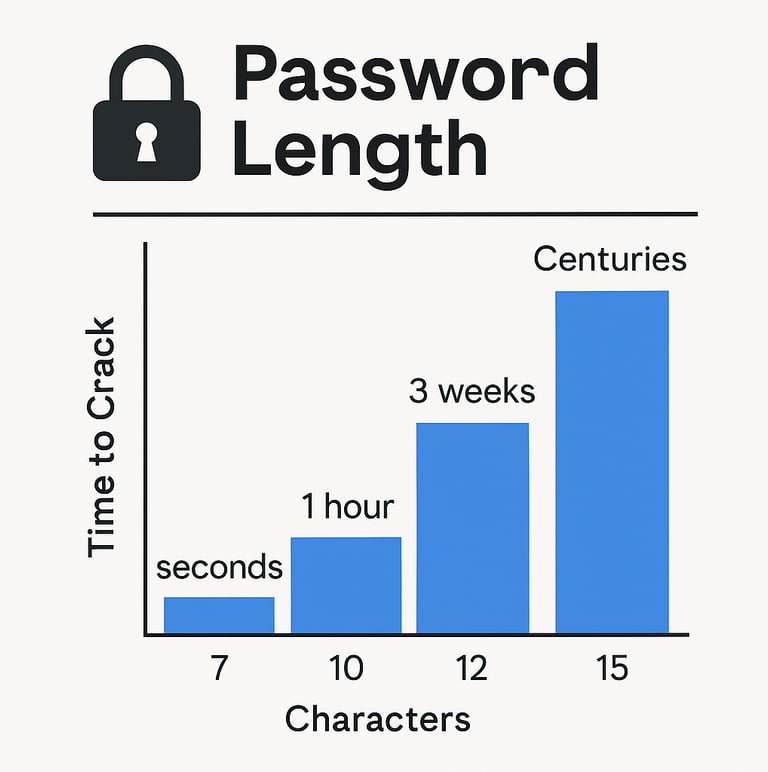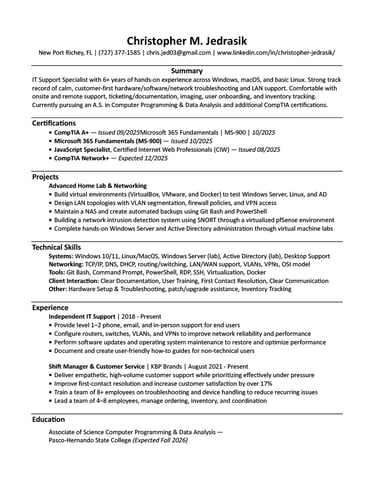How to Create Strong Passwords You’ll Actually Remember
Estimated time: 5–10 minutes Audience: All users
Chris Jedrasik
2 min read


Passwords are like the keys to your house —
but instead of opening a door, they protect your online accounts. A weak password is like leaving the door unlocked. In this guide, we’ll look at why longer, stronger passwords are so important, how hackers actually guess them, and how you can make great passwords you’ll never forget.
1. Why Strong Passwords Matter
Think of your password as a combination lock.
If the lock only has 3 numbers, a thief could try every combo in seconds.
If the lock has 10 numbers, it might take years.
That’s exactly how hackers work — they use computers to guess every possible combination until one works. This is called a brute force attack.
The more characters in your password — and the more you mix in letters, numbers, and symbols — the longer it takes to guess. It’s not just a small difference; it’s an explosion in time.
How Long Does It Take to Crack a Password?
7 lowercase only → less than 1 second (trivial to brute-force)
7 mixed (upper/lower + numbers) → a few minutes
10 mixed → a few days to weeks
12 mixed → thousands of years (very strong)
15 random mixed (letters + numbers + symbols) → millions of years
💡 Every extra character makes your password exponentially harder to crack.
2. How to Build a Strong Password You Can Remember
You don’t have to make your password look like random nonsense. The trick is to make it long, weird, and meaningful to you.
Try using the Passphrase Method — combine a few unrelated words and symbols that make a mental picture:
Example: BlueHorse!DrinksCoffee@Dawn
That’s easy to remember because it tells a story in your head — but it’s nearly impossible for hackers to guess.
Tips:
Use 12 or more characters.
Mix upper/lowercase letters, numbers, and symbols.
Avoid birthdays, names, or words found in the dictionary.
💬 Imagine your password is like a secret handshake — only you should know the moves.
3. How to Remember Passwords Without Going Crazy
You don’t need to memorize every password. There are two easy ways to stay organized.
Option 1: Use a Password Manager
Apps like Bitwarden, 1Password, or Dashlane act like a digital vault.
You only remember one master password, and the app safely remembers the rest for you.
Think of it like having one key that opens a safe where all your other keys are stored.
Option 2: Use a “Core Phrase” System
Make one phrase you’ll always remember, and then add a small twist for each site.
Example:
Main phrase: GreenSky!RunsFast
Facebook: GreenSky!RunsFast_FB
Amazon: GreenSky!RunsFast_AZ
Now every password is unique, but you’ll never mix them up.
4. Add a Second Lock (Two-Factor or MFA Authentication)
Even if someone guesses your password, two-factor authentication (2FA) or multi-factor authentication (MFA) keeps them out.
It sends a code to your phone or email before logging in — like needing both a key and a fingerprint.
Always turn on 2FA for your email, bank, and social media accounts first.
Summary:
Short passwords can be cracked faster than you can make coffee.
Long, creative passwords take so long to break that hackers usually give up.
By following these steps, you’re not just protecting your accounts — you’re locking the door, bolting it, and adding a guard dog.
© 2025 Christopher Jedrasik. All rights reserved.
Directory
Let's Connect!


Built with curiosity and user experience in mind.
